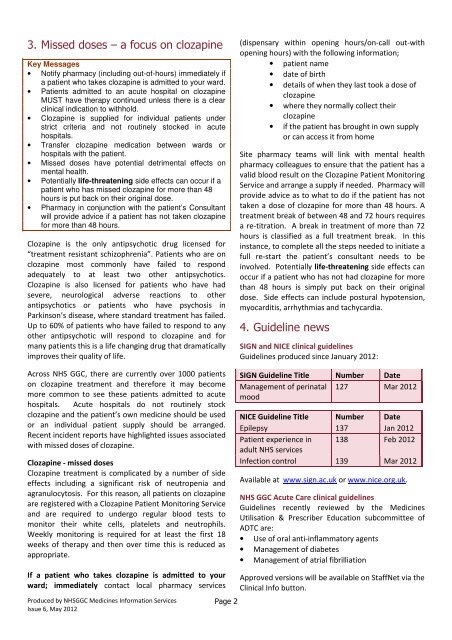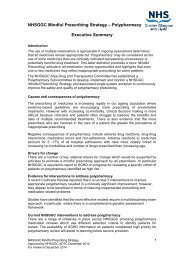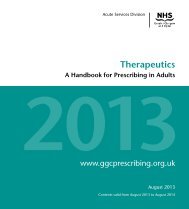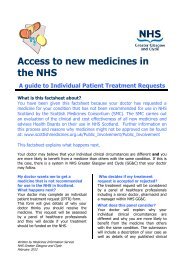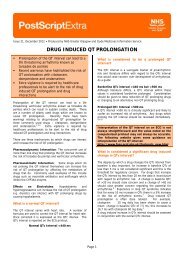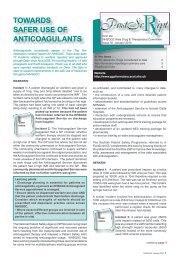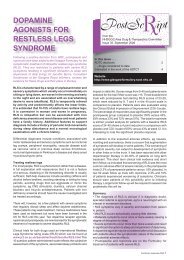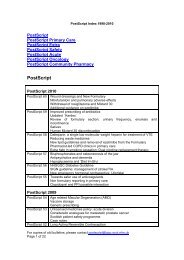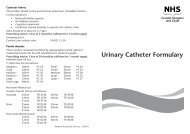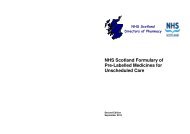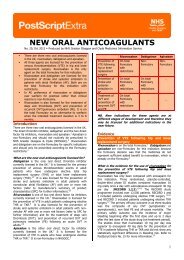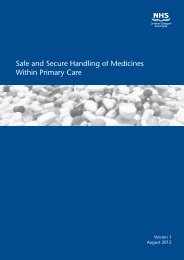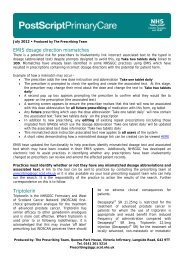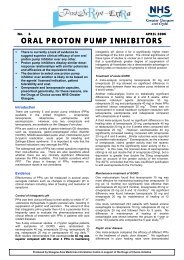1. IV monographs 2. Missed doses - GGC Prescribing
1. IV monographs 2. Missed doses - GGC Prescribing
1. IV monographs 2. Missed doses - GGC Prescribing
Create successful ePaper yourself
Turn your PDF publications into a flip-book with our unique Google optimized e-Paper software.
3. <strong>Missed</strong> <strong>doses</strong> – a focus on clozapineKey Messages• Notify pharmacy (including out-of-hours) immediately ifa patient who takes clozapine is admitted to your ward.• Patients admitted to an acute hospital on clozapineMUST have therapy continued unless there is a clearclinical indication to withhold.• Clozapine is supplied for individual patients understrict criteria and not routinely stocked in acutehospitals.• Transfer clozapine medication between wards orhospitals with the patient.• <strong>Missed</strong> <strong>doses</strong> have potential detrimental effects onmental health.• Potentially life-threatening side effects can occur if apatient who has missed clozapine for more than 48hours is put back on their original dose.• Pharmacy in conjunction with the patient’s Consultantwill provide advice if a patient has not taken clozapinefor more than 48 hours.Clozapine is the only antipsychotic drug licensed for“treatment resistant schizophrenia”. Patients who are onclozapine most commonly have failed to respondadequately to at least two other antipsychotics.Clozapine is also licensed for patients who have hadsevere, neurological adverse reactions to otherantipsychotics or patients who have psychosis inParkinson’s disease, where standard treatment has failed.Up to 60% of patients who have failed to respond to anyother antipsychotic will respond to clozapine and formany patients this is a life changing drug that dramaticallyimproves their quality of life.(dispensary within opening hours/on-call out-withopening hours) with the following information;• patient name• date of birth• details of when they last took a dose ofclozapine• where they normally collect theirclozapine• if the patient has brought in own supplyor can access it from homeSite pharmacy teams will link with mental healthpharmacy colleagues to ensure that the patient has avalid blood result on the Clozapine Patient MonitoringService and arrange a supply if needed. Pharmacy willprovide advice as to what to do if the patient has nottaken a dose of clozapine for more than 48 hours. Atreatment break of between 48 and 72 hours requiresa re-titration. A break in treatment of more than 72hours is classified as a full treatment break. In thisinstance, to complete all the steps needed to initiate afull re-start the patient’s consultant needs to beinvolved. Potentially life-threatening side effects canoccur if a patient who has not had clozapine for morethan 48 hours is simply put back on their originaldose. Side effects can include postural hypotension,myocarditis, arrhythmias and tachycardia.4. Guideline newsSIGN and NICE clinical guidelinesGuidelines produced since January 2012:Across NHS <strong>GGC</strong>, there are currently over 1000 patientson clozapine treatment and therefore it may becomemore common to see these patients admitted to acutehospitals. Acute hospitals do not routinely stockclozapine and the patient’s own medicine should be usedor an individual patient supply should be arranged.Recent incident reports have highlighted issues associatedwith missed <strong>doses</strong> of clozapine.Clozapine - missed <strong>doses</strong>Clozapine treatment is complicated by a number of sideeffects including a significant risk of neutropenia andagranulocytosis. For this reason, all patients on clozapineare registered with a Clozapine Patient Monitoring Serviceand are required to undergo regular blood tests tomonitor their white cells, platelets and neutrophils.Weekly monitoring is required for at least the first 18weeks of therapy and then over time this is reduced asappropriate.If a patient who takes clozapine is admitted to yourward; immediately contact local pharmacy servicesProduced by NHS<strong>GGC</strong> Medicines Information ServicesIssue 6, May 2012Page 2SIGN Guideline Title Number DateManagement of perinatal 127 Mar 2012moodNICE Guideline Title Number DateEpilepsy 137 Jan 2012Patient experience in 138 Feb 2012adult NHS servicesInfection control 139 Mar 2012Available at www.sign.ac.uk or www.nice.org.uk.NHS <strong>GGC</strong> Acute Care clinical guidelinesGuidelines recently reviewed by the MedicinesUtilisation & Prescriber Education subcommittee ofADTC are:• Use of oral anti-inflammatory agents• Management of diabetes• Management of atrial fibrilliationApproved versions will be available on StaffNet via theClinical Info button.


